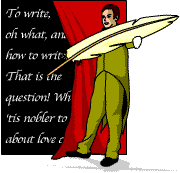Writing Right with Dmitri: My Normal, Your Normal
Created | Updated May 6, 2012
Words, words, words. That's what we're made of. Herewith some of my thoughts on what we're doing with them.
Writing Right with Dmitri: My Normal, Your Normal

Over at my place, we've been watching old/newDoctor Who lately – the 2005 season with Christopher Eccleston as the Doctor. Pretty entertaining. What interests me more than the CGI is the dynamic between the Doctor in his various incarnations and the people he meets in his journeys through time and space. To me, the question of unspoken assumptions – the sort of social subtext, if you will – is one of the most interesting aspects of the series. (I yawn through the monsters, sorry. Flying Daleks fail to move me.) I happened across a comment by some UK writer to the effect that Doctor Who is 'quintessential to being British'. O-kayy. . . but those of us who don't get the local colour references, and don't know anybody who talks like Rose's mother, must be getting something out of it. You might be surprised at what it is.

The Doctor, after all, is not British. He's not even from Earth. Tom Baker's Doctor said so, explicitly. Eccleston responds to 'but you have a Northern accent' by commenting, 'Most planets have a North.' In other words, it is possible to interpret this story in a way that is independent of its core audience's view of space/time – viz, that London (or, in this case, Cardiff) is the centre of the universe. In the interest of full disclosure, I will admit that I found the (extremely well-made and otherwise moving) London Blitz episode irritating. Why? Because the scriptwriters made this man from another planet go on and on about 'their finest hour'. I'm sorry, but other people were brave back then, too. I would like to have heard a speech from the Doctor about, say, Ochi Day. Yes, I know why they did that. I know who's paying the bills, there, and I'm not deaf to the nuances. I also agree that the determination of those people during the Blitz was awesomely admirable. But from an international perspective, and in the context of that story, you know what? The dialogue was tacky. Almost as tacky as The Patriot. Not quite, but almost.
The thing that I really like about this new Doctor Who is the way the Doctor simply ignores the narrow horizons of those around him. He's there to do a job. He gets on with it, leaving the locals to deal with the blow his presence has just dealt to their temporal provincialism. While Rose's mother and clueless bf are worrying about whether their daughter/main squeeze should be swanning around space/time with 'an older man', the Doctor is being flirted with by the omnisexual Captain Jack – who finally kisses him goodbye. On the mouth. I loved it.
That's what space/time travel is about, folks: not reinforcing your prejudices. Exploring. Finding a new approach to the idea of 'normal'. Even, gasp, creating an openly bisexual character who gets his own action figure. I don't seem to be the only one who has noticed this.
What does this excursion into pop television show us? That crafting a story involves the writer's idea of 'normal'. What is normal for you – certain assumptions about patriotism, or sexuality, or class structure – may be quite different from what is normal for me. We may go through real life feeling slightly abnormal, because the way the world works is not the way we think it should work. In fiction, we can express our own ideas about what we find normal, either by adjusting the story to demonstrate the desired state of affairs, or by showing events as they usually ('normally') happen, and critiquing them from our own point of view.
One way to show different ideas of normality is to create a confusion, as JM Barrie did:

"I think it's perfectly sweet of you," she declared, "and I'll get up again," and she sat with him on the side of the bed. She also said she would give him a kiss if he liked, but Peter did not know what she meant, and he held out his hand expectantly.
"Surely you know what a kiss is?" she asked, aghast.
"I shall know when you give it to me," he replied stiffly, and not to hurt his feeling she gave him a thimble.
"Now," said he, "shall I give you a kiss?" and she replied with a slight primness, "If you please." She made herself rather cheap by inclining her face toward him, but he merely dropped an acorn button into her hand, so she slowly returned her face to where it had been before, and said nicely that she would wear his kiss on the chain around her neck. – Peter Pan
You see? Never mind that guy in Casablanca, a kiss is not always a kiss. If you re-read that book, you'll find yourself surprised by Barrie's assumptions. Statements like ' Wendy was every inch a woman, though there were not very many inches' tells you worlds about where his head is in terms of gender roles. So does that crack about 'she made herself rather cheap'.

And what about the characters who are at odds with the 'normal' in their worlds? Well, there's Peter Pan, of course: he ran away to live with the fairies because he wasn't in love with the Edwardian notion of adulthood. Who can blame him? He probably managed to avoid conscription in the Great War. Then there's one of my favourite literary creations, Dickens' Sydney Carton. I don't know how most people interpret Carton, but to me, he is two things: a geek before his time (watch him process information), and someone who is self-medicating a mental disorder. In this excerpt, Carton is talking to Charles Darnay, a man who looks enough like him to be his twin:
"Then you shall likewise know why. I am a disappointed drudge, sir. I care for no man on earth, and no man on earth cares for me."
"Much to be regretted. You might have used your talents better."
"May be so, Mr. Darnay; may be not. Don't let your sober face elate you, however; you don't know what it may come to. Good night!"
When he was left alone, this strange being took up a candle, went to a glass that hung against the wall, and surveyed himself minutely in it.
"Do you particularly like the man?" he muttered, at his own image; "why should you particularly like a man who resembles you? There is nothing in you to like; you know that. Ah, confound you! What a change you have made in yourself! A good reason for taking to a man, that he shows you what you have fallen away from, and what you might have been! Change places with him, and would you have been looked at by those blue eyes as he was, and commiserated by that agitated face as he was? Come on, and have it out in plain words! You hate the fellow." – A Tale of Two Cities
Carton doesn't hate Darnay. Quite the opposite. Carton has just saved the man's life in a courtroom. He will save his life again. Carton's one of the best characters I know: he's ready to lay down his life for his friends. It's a tribute to Dickens' insight that he knew a man like that wouldn't really fit into 'normal' society.
So what is normal for you? Fairies, space flight, sexual subtext? Self-sacrificing geeks? A trip to the corner shops? Whatever it is, you will tell your reader by what you choose, what you leave out, and how your characters, who are (shh) people in your head, react to what they see and hear.
Have fun with them. I'm going to go meditate now. I have a conference call coming up with Alpha Centauri, and that always makes my third eye ache.
Writing Right with Dmitri Archive
